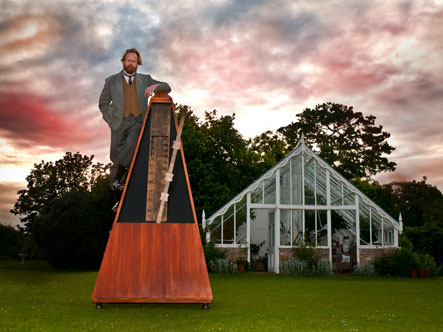From the moment he bursts from his oversized metronomic contraption Robert Lloyd Parry’s time traveller is, like the Ancient Mariner, a man possessed of an urgent need to relay his tale. Dressed merely in a pair of long johns and with a minimalist set, save the machine itself and a garden chair the audience is immediately engaged in discovering the cause of his anxious perplexity.
Wells’ thinly veiled allegorical story is, like William Morris’s News From Nowhere published a few years earlier, a view of an imagined yet supposedly possible future, but unlike Morris’s Utopian view of a happy and fulfilled workforce whose working men gain pride and fulfilment from their labour, Wells’ dystopian future sees mankind as degraded and bestialised. The effete and enervated Eloi, a branch of humanity that evolution has fashioned physically and metaphorically shrunken due to millennia of debilitating ease – ironically the fruit of success, have become the night time quarry of the other half of humanity, the Morlocks, who have been consigned to a pallid troglodytic existence.
The contrast between the two views of the future could not be more marked from men who were both proto-socialists. Whereas Wells’ bleak view is a warning to a society which was at the height of its imperial powers and enjoying the fruits of progress and success, Morris’s vision offered an antidote to the cruel reality of industrialization which he tried to implement through the Arts and Crafts Movement, putting his money where his mouth was in setting up Morris and Co.
Lloyd Parry’s gift as a storyteller is in his ability to convey his sense of wonder at what has befallen him with a detailed exuberance which links our present with the ‘present’ of his Richmond garden of 1895 and in turn, the far distant ‘present’ of the Richmond of 802701 in which he found himself. Lloyd Parry’s portrait of a Victorian scientist, Crusoe-like the superior to those on the distant shore on which fate has cast him up and amusingly, angry that the future is not more like his own present, is compelling. At the same time he gives us an Englishman without fear who is yet totally consumed by his experience. It is a remarkable achievement.
In being a story which is not so much about time travel as an exhortation to consider where we are going as a society The Time Machine remains just as relevant today as is did to the Victorian readers who turned it into a best seller more than a century ago. ★★★★☆ Graham Wyles


